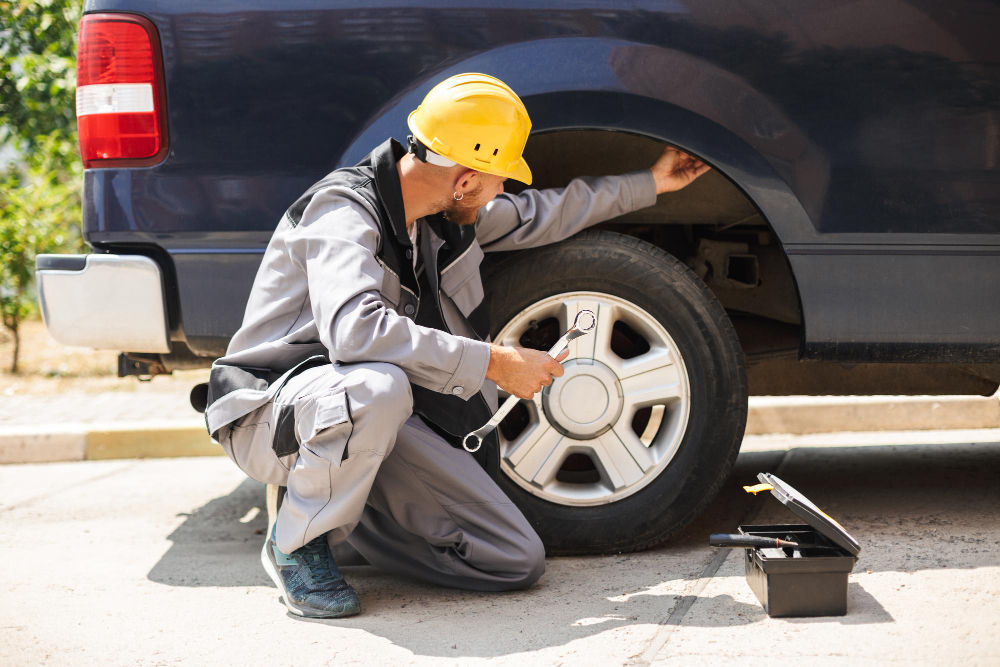As a driver, there’s nothing more frustrating than experiencing a flat tire while on the road. Not only does it cause an inconvenience, but it can also be a safety hazard if not handled properly. Flat tires are a common occurrence on the road, and they can be caused by a variety of factors.
In this blog, we will discuss the top causes of flat tires and provide tips on how to avoid them. Whether you’re a new driver or an experienced one, understanding the causes of flat tires can help you stay safe and avoid costly repairs in the future. So, let’s dive in and explore the top causes of flat tires on the road.
Causes of Flat Tires
Road Hazards
One of the most common causes of flat tires is road hazards. Potholes, debris, and uneven surfaces can cause damage to your tires, leading to punctures or even blowouts. Common objects such as nails, screws, and glass can also puncture your tires. To avoid these hazards, it’s important to stay alert and avoid driving over obstacles on the road. If you can’t avoid them, slow down and drive carefully over them to reduce the impact.
Tire Damage
Tire damage is another leading cause of flat tires. Driving on low tire pressure or overloading your vehicle can put excess strain on your tires. That excess strain can cause them to wear down and eventually become damaged. Using the wrong size of tires or failing to rotate them regularly can also lead to damage. To avoid tire damage, make sure to keep your tires properly inflated and rotated according to your vehicle manufacturer’s recommendations. Additionally, make sure to check your tires for signs of wear and tear and replace them as needed.
Wear and Tear
Over time, tires naturally wear down due to driving habits, weather conditions, and lack of maintenance. Worn-out tires are more prone to punctures and blowouts, so it’s important to replace them before they become too worn. To prolong the lifespan of your tires, make sure to drive carefully and avoid sudden stops and starts. Additionally, regular maintenance such as tire rotations, balancing, and alignments can help to reduce wear and tear.
Manufacturer Defects
Although rare, manufacturer defects can also cause flat tires. Faulty valve stems or weak tire sidewalls can lead to tire failure, resulting in a flat tire. To avoid this, make sure to inspect your tires regularly for signs of defects, such as bulges or cracks in the sidewalls. Additionally, make sure to buy tires from reputable manufacturers and have them installed by trained professionals.
How to Avoid Flat Tires
Check your tire pressure regularly
Proper tire pressure is essential for maintaining the health of your tires. Check your tire pressure at least once a month and before long trips. Make sure to inflate them to the recommended pressure level listed in your vehicle owner’s manual.
Rotate your tires regularly
Rotating your tires can help to distribute wear and tear more evenly, extending the life of your tires. Make sure to rotate your tires according to your vehicle manufacturer’s recommended schedule.
Avoid overloading your vehicle
Overloading your vehicle puts extra strain on your tires, which can lead to damage and flat tires. Make sure to check your vehicle’s weight limits and avoid overloading it.
Drive carefully
Driving habits such as sudden stops, starts, and sharp turns can put extra strain on your tires, causing them to wear down faster. Drive carefully and avoid aggressive driving habits to reduce the risk of flat tires.
Avoid road hazards
As mentioned earlier, road hazards such as potholes, debris, and uneven surfaces can cause flat tires. Avoid driving over obstacles in the road whenever possible, and drive carefully over them when you can’t avoid them.
In conclusion, flat tires can be a frustrating and costly inconvenience. However, by understanding the top causes of flat tires and taking preventative measures, you can reduce your risk of experiencing a flat tire on the road. Remember to stay vigilant, maintain your tires properly, and drive carefully to keep yourself and your vehicle safe on the road.
Also, be sure to check your tires regularly. Look for signs of wear and tear and bulges or blisters in the sidewall. If you notice any of these signs, you should get your tires inspected by a professional. Additionally, it is a good idea to check your tire pressure monthly and to fill up your tires when necessary. Doing so will help to ensure that your tires are properly inflated and able to handle the road.
Flat tires can happen at any time and unexpectedly, Whenever you have a flat tire in the Durham area, you can call on Durham Towing for help. The fast and reliable mobile flat tire service can help you with your car issues as soon as possible…




